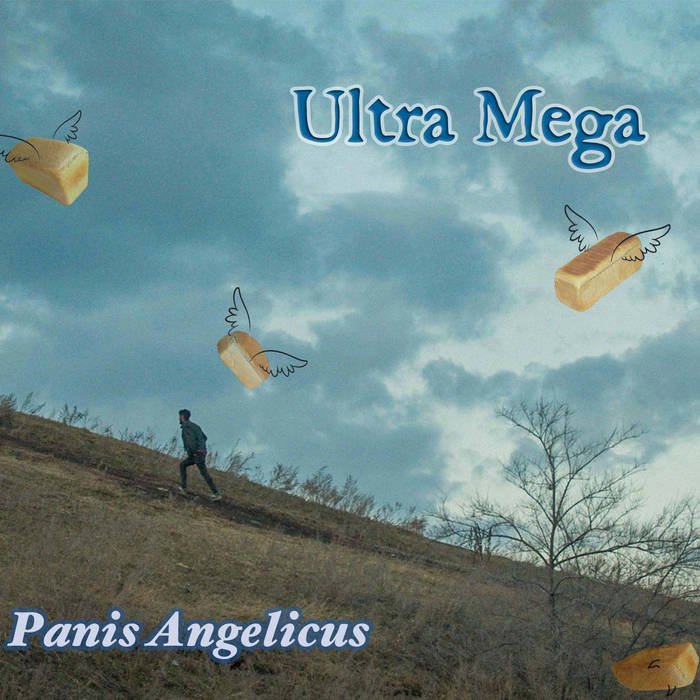Ultra Mega, Tanya Tagaq, and Peach Luffe
Ultra Mega
Panis Angelicus // Eat Em Up Records
Despite my use of musical genre comparison for aiding comprehension, there’s plenty of music out there that breaks the conventions of genre and takes inspiration from a variety of sources. I’ve coined a term for this, “genre salad”, and I find great joy in being able to use it to describe the sound of an album. I’m sure you can see where this is going – enter the newest release from Winnipeg-based band Ultra Mega, Panis Angelicus.
Over the years Ultra Mega has dipped their toes in a variety of sounds, from rearranged Wu Tang Clan songs to 80’s inspired instrumental tracks. For Panis Angelicus it takes a turn to the west with country-esque psychedelia and dry narration style vocals delivered by frontman JD Ormond. This narration adds to the story of the album, which is that of reconciliation between one's ever changing nature with our unchanging memories.
I’m a big fan of concept albums with a tongue in cheek humour style, and Panis Angelicus delivers both with originality and moxie. Being their first full length release in seven years, it was well worth the wait. My favourite song of the album is the fourth track, “Cruisin’ Around”, a humorous yet introspective track that relates to the inner goblin inside us all. It’s such a quotable song that I could have made this whole review an analysis of the lyrics, but you should just listen to it yourself. I know you’ll get a kick out of it.
For those who enjoy some acoustic strummings, beautiful composition, and the power of stories, Panis Angelicus is a must listen. It’s a genre salad with the ranch of the west, the leaves of folk, and the vegetable flesh of a journey back to our old neighbourhoods to experience the memories that penetrate stone and wood - our personal foundations.
- Brandon Kruze
Tanya Tagaq
Tongues // Six Shooter
In Tanya Tagaq’s poetic quasi-memoir Split Tooth, the ripples of trauma in a Northern community are traced as they spread outward, through parents and teachers whose bodies have been literally bent under the weight of abuse, whose struggles with alcoholism and despair move from generation to generation, whose children learn and grow and fight to be understood, to thrive. Her fifth studio album Tongues explodes out of the pages of this book, borrowing sections to give language to Tagaq’s vocalizations as she weaves her own adapted style of traditional Inuit throat singing into a tapestry of sound, its meaning at times just out of reach, at times hair-raising in its directness. Here, Tagaq speaks to the source of this trauma, her teeth bared as she unflinchingly confronts the oppressor. By turns consoling and vengeful, comforting and fearsome, Tagaq’s power as a storyteller has never been more devastating.
Album opener “In Me” is an infiltration— of body, of structure, a prying open. The invitation, or command, is clear: to enter here, you must first shed your body, your ego, your morals, your self. The punishing bass pulse that underlies the pitch-shifted vocal thrums with menace, channeling an otherworldly mantra of self-annihilation. The rhythm of “Tongues” clatters and thumps into life, the processed whines of a violin see-sawing between your ears as the yawning mouth of a cavern opens below. The implicit rhyme of “You can’t have my tongue” and “I want to come” forms a central expression: resistance to oppression through pleasure. For the first half of “Colonizer” Tagaq’s voice runs amok, thrown into analog delays that disappear into the encroaching dark, grounded by its hammering core beat. She gives voice to pure rage, relentless and beautiful and chilling. White and non-Indigenous listeners are reminded: the enemy is not Them, it is You. “Teeth Agape” transforms its narrator into a mother wolf, the descriptions visceral and tactile, teeth sharpened from survival. But when she repeats that line a second time, “It’s from survival”, it is at a near-whisper, all the hurt and fear laid bare.
“Birth” begins with a wordless wail, a new life brought into the world screaming. Her voice becomes a growl and the war drums pound, slowly shrinking into the distance until they are almost white noise, the noise of the tundra. Outstanding track “I Forgive Me” is a paean to trespass, a shattering four minutes and thirty-five seconds as Tagaq simultaneously mourns childhood abuse and addresses those who try to silence survivors: “I do not forgive and forget, I protect and prevent, Make them eat shame and repent.”
“Nuclear” is a chaotic interlude, distorted strings scraping and scribbling until they explode into a digital wilderness of mechanical birds, disorienting and uncanny. “Do Not Fear Love” is an instruction for healing. The icy dirge of synthesizers roar behind her words as though, while urging us to thank our fears for trying to protect us, she is reminding us that the danger is no less present. On “Earth Monster”, a funereal organ swells and recedes beneath the soothing voice of a mother speaking to her daughter, intimately showing us what she has been fighting for all along. From this, “Colonizer - Tundra Mix” emerges as a blistering coda, building brick by bloody brick into a frenzy of feedback and distortion before disintegrating under its own white-hot intensity.
It would be wrong to separate the subject matter on this album from the world into which it was released. While memorials dedicated to the children who died in the residential school system are quietly being swept off of Parliament Hill, Tagaq’s nursery rhyme sing-song voice echoes out: “Oh, you’re guilty, oh you’re guilty.” She takes arms against the governmental and Catholic church-backed efforts to separate Indigenous children from their families, to strip communities of their language and customs, to enforce European belief systems and ways of life, both historically and in the present day. In this way, Tongues’ emotional potency is empowered when it is read as a response to our contemporary social climate in Canada, saturated as it is by neo-colonialism and white supremascist miasma. But it is also somehow larger, too: it exists beyond the present moment, beyond language— like the tundra, it is elemental. And like the tundra, it existed before us, and it will remain long after we have all but disappeared.
- Harman Burns
Peach Luffe
Beyond EP // Self Released
Peach Luffe is the brainchild of singer-songwriter Jong Lee. Lee – originally from Seoul, South Korea and now based in Toronto – began Peach Luffe as a solo project. Peach Luffe has grown to include full-time band members and creative collaborators who together have released a number of singles and EPs. Their newest EP Beyond is self-described as a four track “personal story”. Lee notes that this EP was inspired by the break-up of a five year relationship. Following this break-up, Lee made a healing trip down to San Jose, California to meet a musical friend that he had newly connected with online – artist/producer Mild Monk. After knowing each other for only a week, Mild Monk invited Lee to get away from Toronto after his break-up. Lee jumped on a plane and the two ended up working together on an inspired EP in the span of Lee’s three week stay in California.
As the weather warms in Canada, the polished pop perspective of the Beyond EP presents a similar fresh change of air. Peach Luffe’s emotional lyrics and lush thoughtful arrangements encourage romantic reflection, while the music’s peppiness will put a spring in your step. It is the type of music that is perhaps best enjoyed on a sun-soaked walk through a familiar neighbourhood as one warmly ponders their past relationships. With hints of Harry Styles, Finneas, and Vampire Weekend, the four track EP is a commendable example of pop-songwriting that highlights heartfelt, relatable lyrics. On the opening title-track “Beyond”, Lee’s vocals glisten as he pleads over a catchy throwback video-game inspired beat: “I wish we made it beyond the horizon”. It was this beat by Mild Monk that brought the two together on Instagram. The music video for “Beyond” features footage of their adventures together during Lee’s time in California.
Peach Luffe shines brightly on the EP’s wondrous second track “Disaster”. The relatable lyrics of a dream-love lost make your heart break, “I dream about the days that we once had, I go around and chase but even golden hours bland, nothing excites me, how old and empty…”, and the sound of birds singing in the background deepens the dreaminess of this song. The hooks in this EP are undeniably catchy and fun to sing along with, especially the soft ethereal harmonies of “Disaster” – and particularly the descending phrasing of the word “knowing”: “Now we’re watching disaster unfold knowing we have to let go / our story’s coming to a close knowing we have to let go”. While Peach Luffe’s music clearly connects to the sounds of contemporary pop, it also demonstrates a fondness for the melodies and harmonics of 60s’ pop. The “Oh, oh, oh, oh” that fills the spaces in the chorus of “Disaster” brings to mind background vocals crafted by The Beatles. After the song’s second chorus, the tempo decreases and the track enters a vibey string-filled breakdown that eventually ends with a fade out. This timely moment invites the listener to reflect on whatever they may need to let go.
The EP closes with “Lights” – a hopeful and soothing song reminiscent of the anthemic “Yellow” by Coldplay. “Lights” demonstrates that Lee's trip to California and the making of this music helped him to heal from the sudden breakdown of his relationship: “I’m doing fine, I’ve been alright, the sky is pastel to my eyes, can’t waste my time romanticising that somehow you would be my ending”. As you seek out music that connects to the promising change of seasons, adding Peach Luffe’s uplifting Beyond EP to your collection is a wise choice.
- Gregory Torwalt



